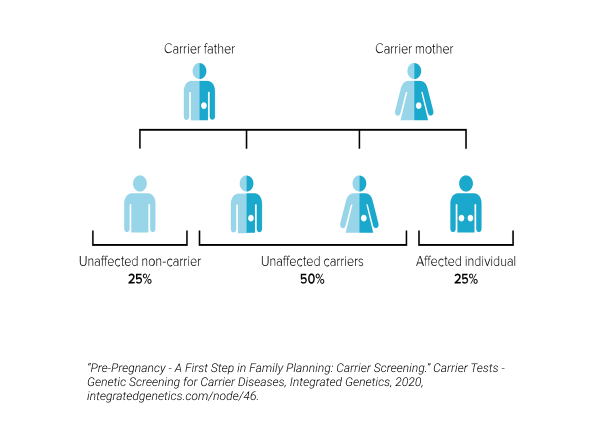
CAUSES
GSD is hereditary
WHAT CAUSES GSD?
GSD is a recessive genetic disorder. Recessive genetic disorders occur when an individual happens to inherit two copies of the same abnormal gene for the same trait/disease from each parent. The diagnosis of GSD1 is established in a patient by identification of two pathogenic variants in either G6PC (GSD1a) or SLC37A4 (GSD1b).
When both parents are carriers, with each pregnancy there is a:
- 25% (1 out of 4) chance that the child will inherit 2 normal genes, and will be neither a carrier or affected by the disorder
- 50% (2 out of 4) chance that the child will inherit one normal and 1 mutated gene, and will be a carrier of the disorder (but not be affected by the disorder)
- 25% (1 out of 4) chance that the child will inherit 2 mutated genes, one from each parent, and will be affected by the disorder
GSD1 occurs in approximately 1 in 100,000 births. There are over 10 different known types of GSD with Type 1 being the most common. The condition affects males and females equally in any population group. The prevalence of GSD1 in Ashkinazi Jews is approximately 1 in 20,000 births.
In 2015, the Children's Fund for GSD Research was instrumental in getting GSD1 added to the prenatal screening panel for genetic diseases.
-
Signs & Symptoms
The primary symptom of GSD1 in infancy is a low blood sugar level.
CONFIG TEMPLATE
This template controls the elements:
FOOTER: Footer Title, Footer Descriptions
CUSTOM MENU: Images and columns into header main menu submenu items
* This message is only visible in administrative mode
This template controls the elements:
FOOTER: Footer Title, Footer Descriptions
CUSTOM MENU: Images and columns into header main menu submenu items
* This message is only visible in administrative mode
The Children's Fund for
Glycogen Storage Disease Research
20 Sherwood Lane
Cheshire, CT 06410


" ... because every child deserves to be healthy."


